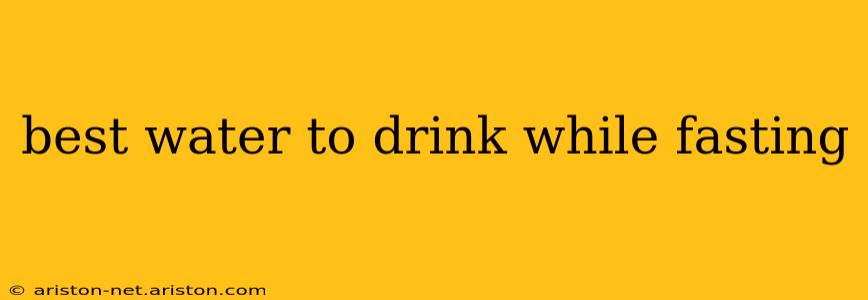Fasting, whether intermittent or extended, is gaining popularity for its potential health benefits. However, staying properly hydrated is crucial during any fast. The type of water you choose can significantly impact your experience and the effectiveness of your fast. This comprehensive guide explores the best waters for fasting and addresses common concerns.
What is the best type of water to drink while fasting?
The best water to drink while fasting is pure, clean water. Avoid any water containing added sugars, artificial sweeteners, or flavors. While some might suggest enhanced waters with electrolytes, these can technically break a fast depending on the ingredients and their caloric content. Plain water is the purest and safest option. This is particularly important for those engaging in longer fasting periods.
Does the temperature of water matter while fasting?
The temperature of your water is largely a matter of personal preference. Cold water might feel more refreshing, especially during a fast, while some find room temperature or warm water easier on their stomachs. Ultimately, there's no scientific consensus on which temperature is superior for fasting. Choose what suits your comfort and tolerance.
Can I drink sparkling water while fasting?
Sparkling water, or carbonated water, is generally acceptable during a fast, provided it doesn't contain any added sugars or artificial sweeteners. However, some individuals find that carbonation can cause bloating or discomfort. If you experience any negative effects, stick to plain water.
What about electrolyte water while fasting?
Electrolyte waters can be controversial during fasting. While electrolytes are essential, many commercial electrolyte drinks contain added sugars or artificial sweeteners that can break a fast. If you’re concerned about electrolyte balance, especially during longer fasts, consult a healthcare professional. They may suggest natural electrolyte sources or low-calorie electrolyte options, or you could consider using unflavored electrolyte tablets or powders which can be carefully measured out.
Should I avoid tap water while fasting?
Tap water is generally safe, but the quality can vary depending on your location. If you have concerns about contaminants, using filtered water or bottled spring water can provide extra reassurance. However, many municipalities provide safe and clean tap water.
Can drinking too much water break a fast?
While proper hydration is vital, drinking excessive amounts of water can dilute stomach acid, potentially hindering the digestive process and impacting the benefits of fasting. Aim for consistent, moderate hydration throughout your fast rather than large gulps of water. Listen to your body's signals; thirst is a good indicator of hydration needs.
What are the benefits of staying hydrated during a fast?
Staying hydrated during fasting is essential for several reasons:
- Maintains bodily functions: Water is crucial for numerous bodily processes, including temperature regulation, nutrient transport, and waste removal.
- Reduces headaches and fatigue: Dehydration can lead to headaches, dizziness, and fatigue, hindering the effectiveness of your fast.
- Supports digestive health: Adequate hydration can aid digestion, even during periods of fasting.
- Improves overall well-being: Proper hydration boosts energy levels and cognitive function.
Conclusion
Choosing the right water during a fast is about simplicity and purity. Plain, clean water, whether filtered, bottled, or from a trusted municipal source, is the optimal choice. Listen to your body, stay consistently hydrated, and consult with a healthcare professional if you have any concerns, especially if you plan to engage in prolonged fasting. Remember, the key to a successful fast is not just what you consume but also how you approach hydration.
